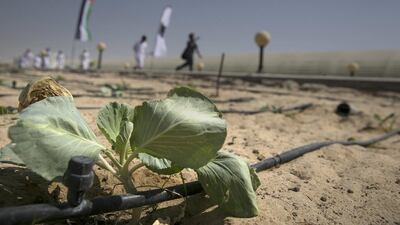No matter how much the human race advances, we will always have some basic needs. Food, water and energy are the most crucial of these, as they are foundational for health, shelter and overall security.
Here, the food-water-energy nexus is more tightly linked than perhaps any other place in the world. Water security is a serious and long-standing concern, a fact highlighted by Sheikh Mohammed bin Zayed, Crown Prince of Abu Dhabi and Deputy Supreme Commander of the Armed Forces, when he said: “Water is more important than oil in the United Arab Emirates”. The country is located in one of the world’s most water-scarce regions, with no perennial surface water resources, a very high water evaporation rate and low groundwater recharge rate. This has necessitated reliance on costly and energy-intensive desalination technologies.
The most serious consequence of inadequate fresh water supply is food insecurity. With 80 per cent of the UAE’s land being classified as desert, crop farming would be highly dependent on irrigation, which is a near impossibility. This results in a dependence on food imports. The Arab Forum for Environment and Development estimates that Arab countries imported 105.8 million tonnes of food in 2011 at a cost of Dh205 billion and the Gulf region alone is expected to spend more than Dh195 billion on food imports by 2020.
And while this country is one of the world’s richest in terms of hydrocarbon resources, overreliance on this finite source of energy is not desirable. The aviation sector is dependent on the whims of the volatile global oil market. Though the price of crude has been decreasing of late, oil has been known to account for 40 per cent of an airline’s total operating costs in years gone by.
Additionally, the international air transport sector contributes approximately 2 per cent to global man-made carbon emissions. These two issues have contributed to the International Civil Aviation Organisation setting 2020 as its target year to achieve carbon-neutral growth for the sector, which makes it even more important to develop a sustainable and low carbon alternative fuel.
It is for these reasons that Masdar Institute of Science and Technology founded the Sustainable Bioenergy Research Consortium with Etihad Airways, Boeing and Honeywell. The SBRC is meant to help address some of the UAE’s basic needs.
SBRC has grown, with Safran and GE joining more recently, and the consortium’s efforts have evolved to target the UAE’s long-term strategic needs too. Through its Integrated Seawater Energy and Agriculture System, the SBRC intends to address the UAE’s water, food and energy needs in a way that is both sustainable and economical.
This is why the SBRC has started to construct the world’s first bioenergy pilot project. It uses desert land to produce both bioenergy and food through seawater irrigation. This is a good way to preserve freshwater resources.
Located in Abu Dhabi, this project will see the construction of a closed-loop system that addresses all three points of the water-food-energy nexus. The system starts with aquaculture units that use seawater to raise shrimp and fish. The waste produced by the fish and shrimp serves as a fertiliser that promotes the growth of a halophyte plant species called Salicornia. This hardy plant thrives in deserts, doesn’t require fertile soil and can be irrigated with seawater, to produce crops with enough oil and sugar content to be turned into biofuels and biochemicals. The remaining nutrients from the agriculture process are then diverted into mangrove forests, which eliminate nutrients and waste from the food production while also playing two other valuable roles – in the marine ecosystem, as nurseries for young fish and as carbon scrubbers from the atmosphere.
This integrated system thus intends to have five positive outcomes. It will provide sustainable food in the form of fish and shrimp; it will produce renewable energy in the form of bio jetfuels, bioethanol, biogas and green diesel from oil-rich native plants; it can produce valuable export products in the form of biochemicals; it will contribute to a healthier environment in the form of enriched mangroves; and it will do all of this without taking away from the country’s limited stock of freshwater resources or farmland.
The project will address some of the UAE’s concerns for food, energy and water security in a way that strengthens its economy and environment.
Dr Alejandro Ríos G. is the director of the Sustainable Bioenergy Research Consortium and a professor of practice at the Masdar Institute of Science and Technology

